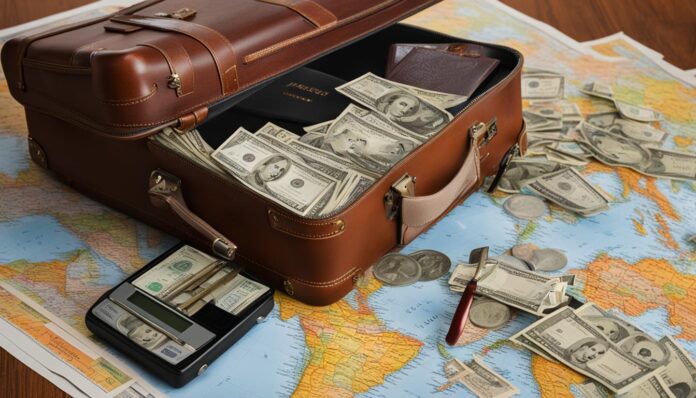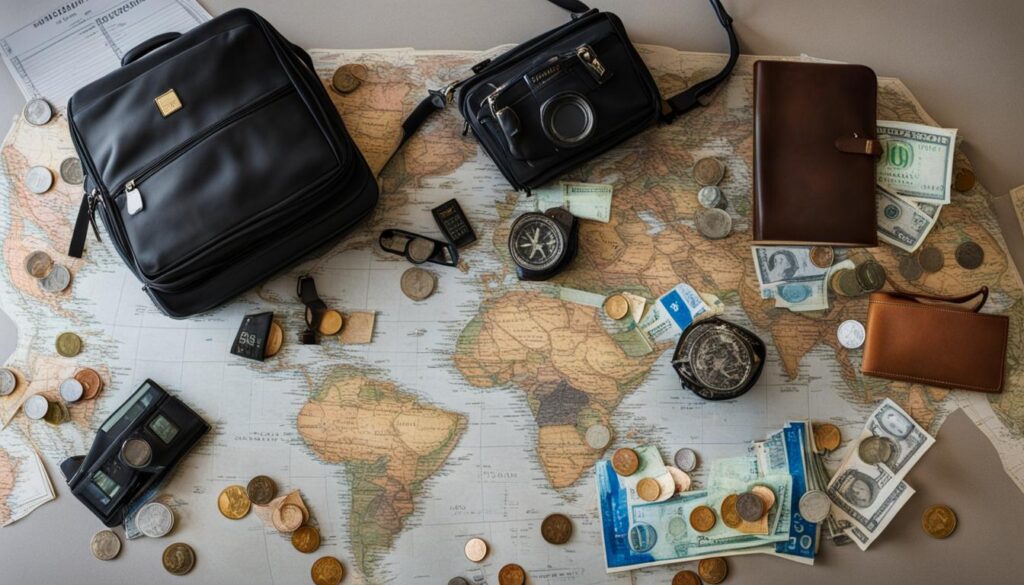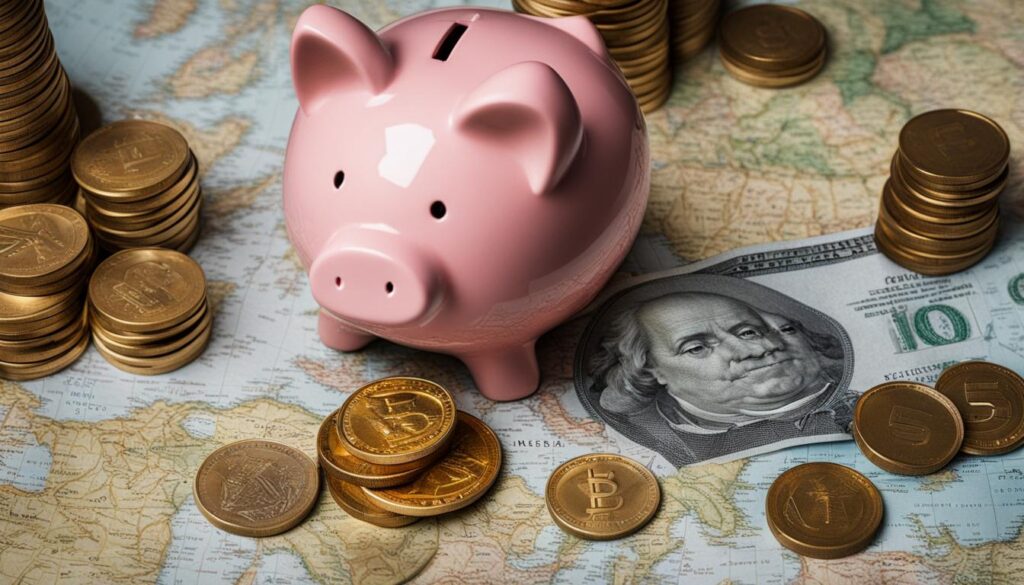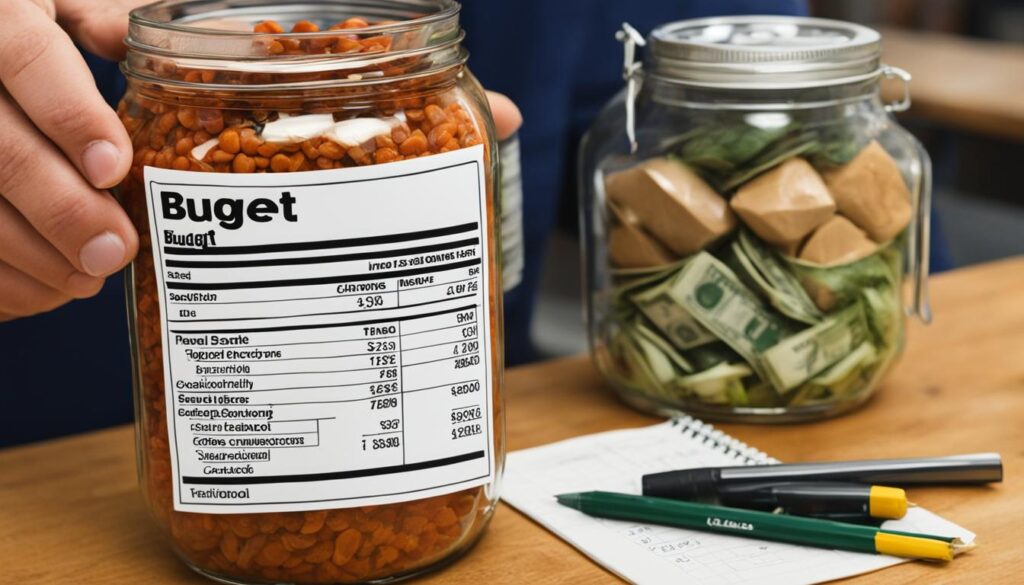Are you considering embarking on a solo adventure, but unsure how to manage your finances? Look no further than our essential guide to budgeting for a solo trip. From determining your trip budget to saving money, booking affordable accommodation, and managing unexpected costs, we’ve got you covered.
In this comprehensive guide, we’ll provide you with solo trip budget planning tips and strategies to ensure your adventure doesn’t break the bank. So, what are some tips for budgeting for a solo trip? Let’s dive in.
Determining Your Trip Budget
Before setting off on your solo adventure, it’s vital to determine your trip budget. This involves calculating your expenses and setting a realistic budget based on several factors like destination, travel duration, accommodation preferences, transportation, meals, activities, and miscellaneous expenses.
Start by assessing your financial situation and determine how much you can afford to spend. Be honest with yourself about your financial limitations, but also keep in mind that you can always find ways to save money where possible.
Here are some tips for determining your trip budget:
1. Breakdown of Expenses
Create a list of all the expenses you’re likely to incur on your trip. This includes transportation costs, accommodation costs, food, activities, travel insurance, and any additional expenses that may come up. By breaking down your expenses, you can have a clear idea of how much you need to save and budget for each category.
2. Research Destination Costs
Research the cost of living and travel expenses in your chosen destination. This will help you estimate how much you’re likely to spend on meals, transportation, activities, and other expenses. You can use travel guides, online resources, or ask fellow travelers for advice on budgeting for your specific destination.
3. Set Priorities
Identify the activities and experiences that are most important to you and prioritize them in your budget. This will help you allocate your funds wisely and ensure that you get to enjoy the most important parts of your trip.
4. Plan for Contingencies
Always plan for unexpected expenses, such as medical emergencies, lost or stolen belongings, or itinerary changes. Set aside some emergency funds in case anything goes wrong during your trip.
5. Reevaluate Your Budget
Keep track of your expenses during your trip and adjust your budget accordingly. This helps you to stay within your budget and avoid overspending. You can use budgeting apps, spreadsheets, or a simple notebook to track your expenses.
By following these budgeting strategies for traveling alone, you can create a realistic budget for your solo trip. Remember to be flexible and open to adjusting your budget as you go along. Bon voyage!
Researching Destination Costs
Once you’ve calculated your trip budget, it’s essential to research destination costs to ensure your budget aligns with the cost of living and travel expenses in your chosen destination.
Start by researching the average cost of accommodation, food, and transportation in your destination. You can consult travel websites and forums, such as TripAdvisor and Lonely Planet, to gather information.
Consider the time of year you plan to visit, as prices can fluctuate based on seasonal demand. Furthermore, look into the exchange rate of your destination country’s currency and consider how that might impact your expenses.
Here are some budgeting tips for common expenses during a solo trip:
| Expense | Budgeting Tip |
|---|---|
| Accommodation | Consider alternative options such as hostels, Airbnb, or camping sites for cheaper accommodations. Research the location and amenities before booking to ensure safety and comfort. |
| Food | Explore local markets and grocery stores for budget-friendly, fresh food options. Try local street food or food trucks for an authentic experience without breaking the bank. |
| Transportation | Research and compare transportation options, such as renting a bicycle or using public transportation instead of taking taxis or using ride-hailing services. |
| Attractions | Plan ahead and prioritize the must-see attractions to get the best value for your money. Consider using city passes or discounts for multiple attractions or tours. |
Researching destination costs is crucial to staying within your budget and avoiding any unexpected expenses during your solo adventure.
Saving Money for Your Solo Trip
One of the most important aspects of solo trip budget planning is saving money. When planning your adventure, it’s crucial to have a financial cushion that allows you to enjoy your trip without worrying about money. Here is a list of practical tips and strategies that can help you keep your trip expenses low and increase your savings:
- Budgeting: Determine how much money you need for your trip and set a realistic budget. Use a budgeting app or spreadsheet to help you keep track of your expenses and ensure that you stay within your budget.
- Cutting expenses: Look for ways to cut your everyday expenses such as subscriptions, unnecessary purchases, or dining out. Even small savings can add up and make a significant difference to your travel budget.
- Generating extra income: Consider taking on a part-time job, selling items you no longer need, or freelancing to earn extra money for your trip.
- Finding deals: Search for deals on flights, accommodations, and activities. Consider traveling during off-peak seasons, booking in advance, and using loyalty programs or credit card rewards to save money.
- Traveling light: Pack only the essentials and avoid paying extra baggage fees. Additionally, consider packing snacks or meals for your flight or long bus rides to save on dining expenses.
- Using public transportation: Research public transportation options in your destination and compare prices to find the most cost-effective mode of transportation. Additionally, consider walking or biking to explore your destination and save on transportation costs.
By implementing these tips and strategies, you can save money for your solo trip and ensure that you have enough funds to fully enjoy your travel experience.
Booking Affordable Accommodation
Accommodation can account for a significant portion of your solo trip budget. Here are some tips for finding affordable accommodation options:
- Hostels: Hostels offer budget-friendly communal living arrangements and a great opportunity to meet fellow travelers. Many hostels also organize activities and tours.
- Guesthouses: Guesthouses offer private rooms at prices usually lower than hotels. They often provide basic amenities such as breakfast and WiFi.
- Budget hotels: Budget hotels provide basic accommodation at economical prices. They are generally located in central areas and provide easy access to public transportation.
- Vacation rentals: Vacation rentals such as Airbnb, VRBO, and HomeAway offer affordable accommodation options ranging from shared rooms to entire apartments or houses.
- Alternative accommodations: You can also explore alternative accommodation options such as homestays or house-sitting opportunities. These options provide unique experiences and are often cheaper than traditional accommodation.
Be sure to research the location and the amenities provided to ensure the accommodation you choose aligns with your budget and preferences.
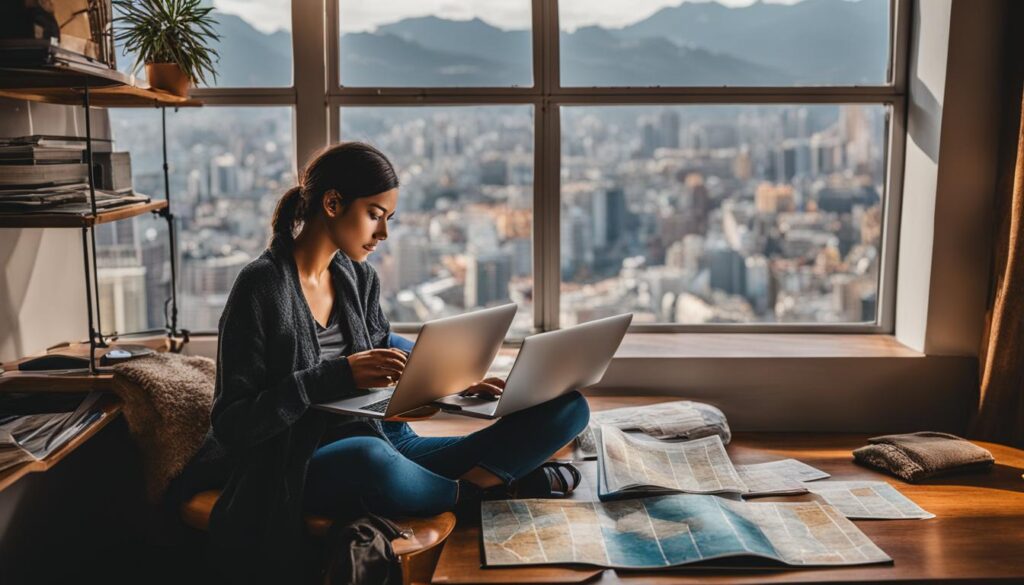
Transportation on a Budget
Transportation is one of the biggest expenses when traveling alone. However, there are several ways to save money while getting around efficiently.
Use Public Transportation
When traveling alone, public transportation is an excellent budget-friendly option. Most major cities have comprehensive public transportation systems, including buses, trains, subways, and trams. Research the routes and schedules before your trip and consider purchasing a day or week pass to save money on multiple trips.
Book Flights at the Right Time
If you’re planning to fly to your destination, timing is crucial to get the best deals. Book your flight in advance or at the last minute to snag discounts. You can also sign up for alerts on price drops and promotions with travel websites and airlines.
Utilize Ridesharing Services
Ridesharing services like Uber and Lyft are a popular and affordable way to get around cities. Check for promotional codes or coupons before you ride to save even more money. If you’re comfortable sharing your ride, opt for carpooling services like UberPool or Lyft Line, which can further reduce the cost.
Consider Alternative Modes of Travel
Walking, cycling, and other alternative modes of travel are not only budget-friendly but also great for your health and the environment. Rent a bicycle or walk if the distance is manageable, or utilize bike-sharing programs available in many cities. You can also use a scooter-sharing app like Lime or Bird, which are affordable and convenient for short distances.
Navigation Apps
Navigation apps like Google Maps and Waze are excellent tools to help you save money on transportation. You can compare prices for car rentals, taxis, and ridesharing services, as well as access real-time bus and train schedules and routes. Also, check if the city you’re visiting has its own transportation app or website to avail discounts and save money.
With these tips and strategies for budgeting transportation expenses, you can stay within your budget while traveling alone without sacrificing comfort or convenience.
Managing Meal Expenses
Food expenses can quickly add up and put a dent in your solo trip budget. To save money and stay on track, try implementing the following tips:
- Discover local markets where you can buy fresh produce and other groceries to prepare meals on your own. This will save you money on eating out and allow you to experience the local food culture.
- Cook your own meals using the kitchen facilities provided by your accommodation or consider booking accommodations with a kitchenette or shared kitchen to have more cooking options.
- Look for budget-friendly dining options in your destination, such as street food stalls, food trucks, or local cuisine restaurants that offer affordable menus.
- Utilize loyalty programs or discounts when dining out, such as credit card rewards, coupon codes, or apps that provide restaurant discounts.
Keeping your meal expenses in check will ensure that you have more funds to use for other experiences during your solo trip. Additionally, pay attention to how much you drink as alcohol can quickly increase your expenses. Staying hydrated with water is not only budget-friendly but essential for staying healthy during your travels.
Planning Activities within Your Budget
Exploring new destinations and trying new activities are the highlights of any trip. However, doing these things while staying within your budget may seem challenging. Here are some tips to help you plan activities while keeping your expenses minimal:
- Focusing on free or low-cost attractions: Many destinations offer free walking tours, museums, and parks that allow you to explore the city without spending a lot of money. Research online to find out what’s available in your destination.
- Utilizing city passes: Many cities offer city passes that allow you to visit multiple attractions at a discounted rate. These passes can be cost-effective if you plan to visit several paid attractions.
- Researching discounts: When planning your activities, research discounts and promotions available through websites like Groupon or Living Social. You may be surprised to find affordable deals on tours, experiences, and dining options.
- Seeking out affordable local experiences: Instead of visiting touristy attractions that may be expensive, consider seeking out local experiences such as attending a sporting event or visiting a local market. These activities can provide an authentic experience at a lower cost.
Remember, it’s essential to plan your activities within your budget to avoid overspending. But don’t worry, you can still have an enjoyable trip without breaking the bank!
Currency Exchange and Money Management
Managing your finances during your solo trip requires a good understanding of currency exchange and money management. By following these tips, you can ensure that you have access to enough cash while avoiding unnecessary fees and expenses.
Currency Exchange
Before you embark on your solo adventure, research the currency exchange rate in your destination country and find a reputable currency exchange provider. Avoid exchanging currency at airports or tourist hotspots, as these places typically offer less favorable exchange rates and higher fees.
Consider using a debit card or credit card to withdraw cash in the local currency from an ATM, as this may provide a more favorable exchange rate than exchanging cash. However, make sure to check with your bank to see if they charge international transaction fees or ATM fees to avoid any surprises.
Tip: Use an online currency converter to get an idea of the exchange rate and calculate estimated expenses in the local currency. This will help you budget accurately and avoid overspending.
Travel-Friendly Credit Cards
Using a credit card is a convenient and secure way to make purchases during your solo trip. Look for travel-friendly credit cards, which offer rewards, cashback, and travel benefits such as no foreign transaction fees or insurance. Compare credit cards to find the best one that suits your travel needs and spending habits while avoiding high annual fees and interest rates.
Emergency Cash
It’s essential to carry emergency cash in case of any unexpected situations or emergencies. Keep small denominations in a secure location separate from your wallet or purse to avoid theft or loss. Consider carrying a travel money pouch or wallet that can be hidden under your clothes.
Expense Monitoring
Monitoring your expenses is crucial to staying within your budget during your solo trip. Use a budgeting app or spreadsheet to track your spending, and make sure to account for any transactions or fees charged by your bank or credit card provider. This will help you keep your spending under control while maximizing your travel experience.
Unexpected Expenses and Contingency Planning
Even with careful planning, unexpected expenses can arise during your solo trip. It’s important to have a contingency plan in place to handle financial emergencies without derailing your budget.
“Expect the unexpected. Life is full of surprises, and it’s best to be prepared for anything.”
– Maya Angelou
Some common unforeseen costs to consider include medical emergencies, lost or stolen belongings, flight cancellations or delays, and unforeseen transportation costs.
Medical Emergencies
Illness or injuries can quickly derail your trip and add to your expenses. To prepare for medical emergencies:
- Check if your health insurance covers international medical expenses.
- Research the location of hospitals or clinics in your destination.
- Pack a basic first-aid kit with essential medications and supplies.
- Consider purchasing travel insurance that includes medical coverage.
Lost or Stolen Belongings
Losing your passport, cash, or credit cards can be a nightmare. To prepare for lost or stolen belongings:
- Make copies of your important documents, such as your passport and travel itinerary.
- Keep your valuables in a secure location, such as a hotel safe or a money belt.
- Notify your bank and credit card companies immediately if your cards are lost or stolen.
Flight Cancellations or Delays
Flight cancellations or delays can cause additional expenses, such as hotel accommodations, transportation, and food. To prepare for flight disruptions:
- Research the airline’s policy on flight disruptions and compensation.
- Create a backup plan, such as booking alternative flights or transportation options.
- Check if your travel insurance includes trip interruption coverage.
Unforeseen Transportation Costs
Transportation costs can vary and add up quickly during your trip. To prepare for unforeseen transportation costs:
- Research the transportation options in your destination, such as public transportation, taxis, or ride-sharing services.
- Consider purchasing a transportation pass, if available, that covers multiple rides.
- Have emergency cash on hand to cover unexpected transportation costs.
Having a contingency plan and extra funds can help you handle unexpected expenses and maintain your budget during your solo trip. By budgeting for unforeseen costs, you can protect yourself financially and enjoy your adventure stress-free.
Tracking and Adjusting Your Budget
Now that you’ve established your trip budget and researched your destination costs, it’s important to keep track of your expenses and adjust your budget as needed to ensure you stay within your financial means.
Here are some useful tips and tools for tracking and adjusting your budget:
Keep a Budget Spreadsheet
Create a spreadsheet to track your daily expenses and compare them to your estimated budget. Include categories such as accommodation, transportation, food, activities, and any other expenses. This will provide a clear overview of your spending and help you identify areas where you can cut costs.
Use Budgeting Apps
Consider using budgeting apps such as Mint, PocketGuard, or Goodbudget to help you track your expenses and stay on top of your budget. These apps can connect to your bank account and credit cards, automatically categorize your spending, and provide you with notifications when you’re approaching your budget limits.
Re-Evaluate Your Budget Regularly
Continuously monitor your spending and adjust your budget as needed to ensure you’re staying within your financial means. Accurately tracking your expenses and regularly re-evaluating your budget can help you make informed decisions about where to allocate your funds and keep you on track to achieving your financial goals.
“Remember, budgeting is not a one-time activity. It requires continuous monitoring and adjustments to ensure you stay on track and make the most of your funds.”
Conclusion
Congratulations, you have now gained valuable insights into budgeting for your solo trip. By following the tips and strategies mentioned in this guide, you can plan your trip efficiently and save money. Remember to determine your trip budget, research destination costs, save money, book affordable accommodation, manage meal expenses, plan activities within your budget, exchange currency and manage money, account for unexpected expenses, and track and adjust your budget.
Budgeting for a solo trip can seem daunting, but with careful planning and management, you can make the most of your funds and enjoy a stress-free travel experience. So, pack your bags, and set out on your solo adventure with confidence, knowing that you have planned your budget wisely. Happy travels!




























